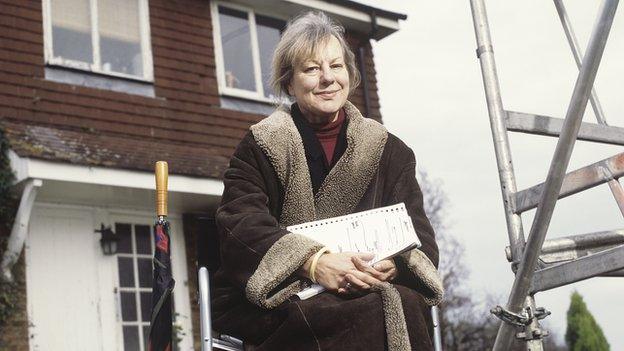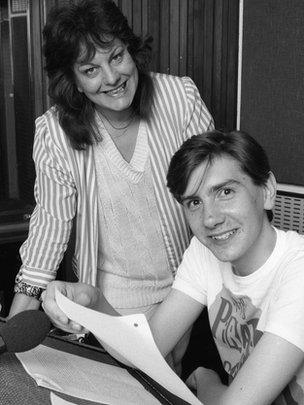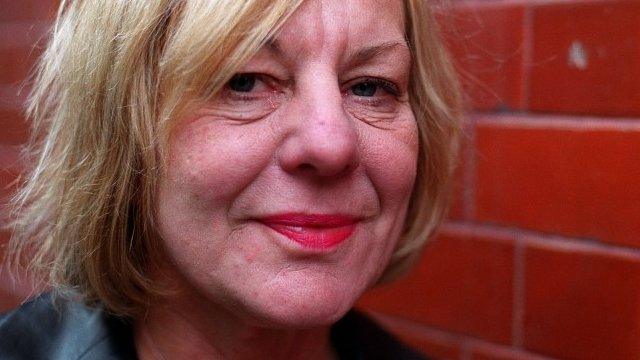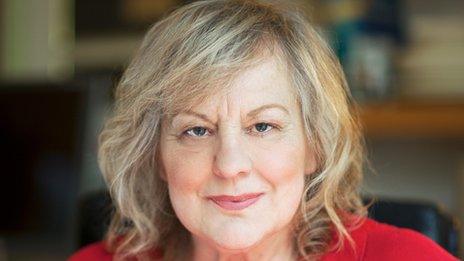Obituary: Sue Townsend
- Published
David Sillito looks back at the life of Sue Townsend
Sue Townsend failed her 11 plus, left school at 15 and wrote in secret, but she went on to become one of the UK's best-selling and beloved authors.
Susan Lillian Townsend was born in Leicester in 1946, the city where she set her most famous work, The Secret Diary of Adrian Mole, aged 13 3/4.
The story of the pimply, pretentious teenager who painted his room black and obsessed about a girl called Pandora sold two million copies when it was released at the end of 1982.
Adored by fellow teenagers and adults alike, the book was followed by The Growing Pains of Adrian Mole in 1984 - making Townsend the best-selling novelist of the 1980s.
'Books free you'
Townsend said she grew up "comic-poor - what the Americans now call trailer-trash", as the eldest of three daughters.
But there were always books in their home and, after discovering children's classics, she was soon reading one a day.
"I do think that books, good books, free you," she told writer Alan Clark, a friend and former creative writing student who interviewed her for Mediterranean Life magazine.
"They make you feel a citizen of the world and things like class, sex and age don't matter. They're the greatest leveller."
After leaving school, she worked as a petrol pump attendant, shop assistant and factory hand, before training as a community worker.
She married at 18 but hid her writing from her first husband, inside sofa cushions and under the stairs. He left her and she was soon juggling three jobs, writing at night while her three children were asleep.
"I became an insomniac, really, hardly slept at all, didn't even try to," she told The Guardian in 2009, external.
"And it's carried on. I hate to say I only need as much sleep as Mrs Thatcher, but I can cope really well on five hours."
It was not until she confessed all to her partner Colin Broadway - who she later married and had another child with - that she was encouraged to join a local writers' group at the Phoenix Theatre in Leicester, winning an award for her first play.
'Adrian's everywhere'
The Adrian Mole series first started life as a play on BBC Radio 4 - first broadcast with the title The Diary of Nigel Mole, Aged 13 1/4.
A publisher heard it and offered her a contract to turn it into a book. A name change and another seven instalments followed along with TV and theatre adaptations.
Townsend often said she identified with Adrian but she was amazed by the book's success, both in the UK and abroad.
"Now I realise that Adrian is simply a type of person who exists everywhere, regardless of nationality," she told Clark.
"Shy, thoughtful, oversensitive, repressed. In a hut in the Gambia at this moment, there's an Adrian Mole getting on people's tits."

Townsend on the set of the TV series of Adrian Mole: The Cappuccino Years, where she took star Stephen Mangan under her wing
She never allowed any of the books to carry an illustration of Mole though, as she wanted people to be able to visualise the character for themselves.
Failing health
Townsend had a heart attack when she was just 40 and was registered blind in 2001, after a 15-year battle with diabetes.
She would lie on a sofa, dictating her final books to her writer son Sean, who - in 2009, donated one of his kidneys to his mother.
"It makes me sound like Barbara Cartland. But I'm never as well groomed as she was," she joked in a Big Issue interview, external in March 2012.
During a BBC interview later that month, at the new Mansfield Library where she was speaking to a visually-impaired reading group, Townsend said of losing her sight: "You can't underestimate what a devastating blow it is."
She added: "People would say, 'You're so good about it.' But inside... to me not being able to read, I still haven't come to terms with it yet."
She also had neuropathic arthropathy - Charcot's joint - which weakened the bones in her legs and feet and meant she had to use a wheelchair.
Before she lost her sight completely, Townsend would carry a large magnifying glass, which Stephen Mangan - who played Adrian in the BBC adaptation of The Cappuccino Years - remembers being trained on him.
"When I auditioned to play Adrian, I remember she told me that he couldn't be too good looking," he said.
"She pulled out a magnifying glass, came up right to my face - because her sight was just in the last stages of going, scanned me all over and said that I was indeed 'not good-looking enough to play the part'.
"She was very funny, there was a lot of laughter whenever you met Sue," added Mangan.
The Cappuccino Years was a satire on New Labour, with Pandora now an MP and Adrian a chef in London.
Townsend was a passionate socialist and politics also influenced Adrian Mole's teenage years, under Thatcher's government.
The eighth Mole instalment, Adrian Mole: The Prostrate Years, was published in 2009.
However, Townsend suffered a stroke over Christmas 2012 and, at the Oxford Literary Festival a few months later, revealed she had to push back the release date of the ninth book as a result.
"It was on the way until the stroke interrupted me," she said.
'A masterpiece'
Her other best-selling novels include The Queen and I - about the Royal Family being forced to move to a council estate after a revolution - and 2012's The Woman Who Went to Bed for a Year, about a middle aged mum who refuses to get up from bed.
"Oh I'd love to [do that]," Townsend told The Big Issue.
"A month would be great. Just getting up now and again, you know, to take showers and stuff. I wouldn't get bored, I'd listen to the radio."

Sue Townsend with actor Nicholas Barnes, who played Adrian Mole in a radio adaptation, in 1985
Townsend also published a more serious novel, Ghost Children, about the life-long effects of having an abortion, based on her own experiences - and often talked about writing "a masterpiece".
"I wanted to be Dostoevsky but my way of coping with the world has always been humour," she told Clark.
"In the playground I always made people laugh, I used to charge them three pence for an impression of a teacher. It kept me in toffees."
Writers and comedians including JK Rowling, David Walliams, Matt Lucas and Caitlin Moran were all quick to pay tribute to that humour on Twitter.
Having left school at 15, Townsend was awarded an honorary Masters of Arts from Leicester University and, in 2008, was made a Distinguished Honorary Fellow of the university.
She was also an Honorary Doctor of Letters at Loughborough University and a Fellow of the Royal Society of Literature.
"I hate it when people call me a 'national treasure'," she told The Guardian, external in 2010, while promoting The Prostrate Years.
"It takes away your bite and makes you feel like a harmless old golden Labrador."
In 2009, Townsend was given the Honorary Freedom of Leicester.
She was surrounded by her family when she died at her home in the city on 10 April, following a short illness.
- Published11 April 2014

- Published20 March 2013
